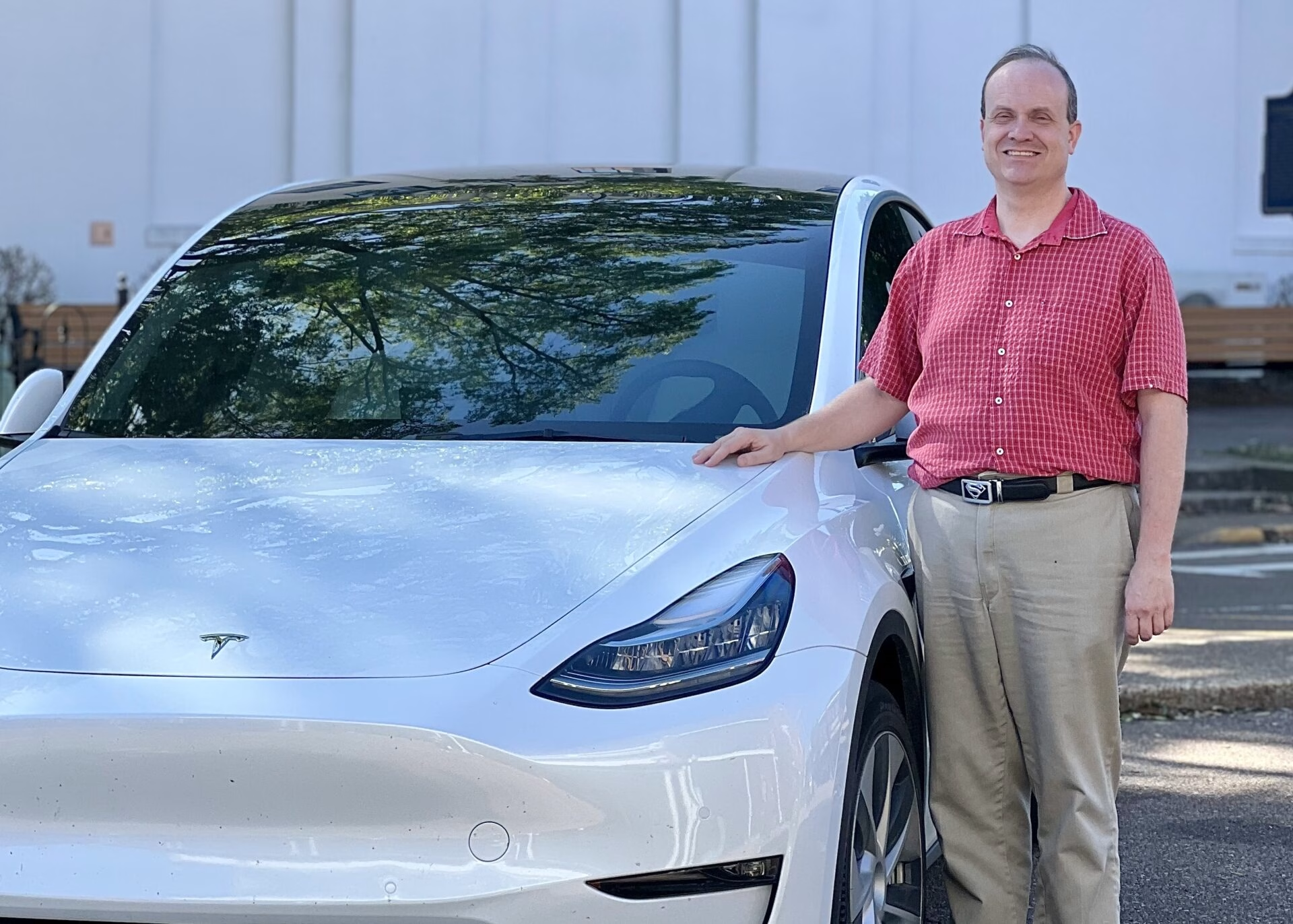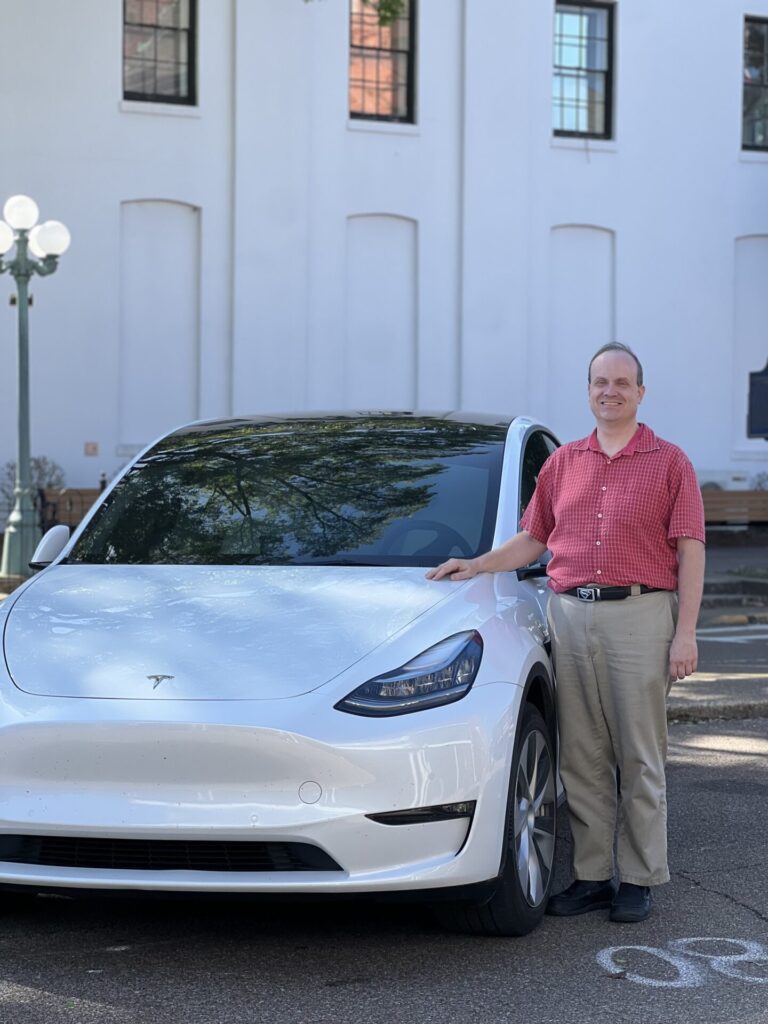By Eva-Marie Luter, Journalism Graduate Student
OXFORD, MS — In recent years, the southeastern United States has seen a significant increase in electric vehicle (EV) adoption, with the market share doubling this year alone, according to iea.org. Mississippi is no exception, with many now starting to take notice of this new and innovative mode of transportation.
Oxford resident Bill Taylor has owned two Teslas so far and loves saving money on fuel. “Just imagine every day when you wake up, you have a full tank of gas and ready to go anywhere on the road you want,” he said, who now drives a Model Y. According to Taylor’s Tesla app, he has saved over $2,000 on gas in the last year, with a total spend of only around $600 on charging his EV. “Yes, my energy bill went up, but not as much as my gas bill for my car went down,” Taylor said. According to Bill Taylor, the previous Tesla that he had owned before he purchased his new Model Y sold at a “great price” in less than two weeks.
Even though Tesla has a built-in map that offers drivers the locations of EV chargers, it is still incomplete. For example, as of April of 2023, Tesla’s map does not take into account the charging stations on the University of Mississippi’s campus. An app called PlugShare provides a more comprehensive map, however, if you don’t wish to download an app or purchase a Tesla, you can see Mississippi’s first interactive map of every documented EV charging location here. Map credits: Eva Luter
The Convenience and Cost Savings of EV Ownership: Bill Taylor’s Experience
Taylor also benefited from the federal Inflation Reduction Act, which offers consumers up to $7,500 in compensation for purchasing an electric vehicle if the battery is made in the United States. And Taylor has discovered one more financial benefit: “I just started “Ubering” with my Tesla, now that it’s more economically friendly than my previous car. And for every ride, Uber will pay you $1 more as another further incentive to own an electric vehicle. So there’s an added bonus.”
Taylor said EVs are simply making driving more enjoyable.
“The reason why I bought a Tesla is that my family and I love to travel… We would go on long family road trips. After years of having to stay alert and at attention on the road, and being utterly exhausted when you arrive at your destination, we decided that it was time for a change.”
Taylor appreciates the self-driving capabilities of his Tesla, which allow him to be less attentive to the small details of driving, such as keeping the car in the middle of the lane and maintaining a safe distance from other vehicles. “It gives me peace of mind, knowing that most of the time it can see much more than just my eyes can,” he said. In addition, the Tesla alerts him when the battery is low, providing information about the nearest charging stations and how to adjust his speed to reach his destination.
However, owning an electric vehicle is not without its challenges. “Since it’s fully electrically powered, the wheels lock up and need to be powered by the car’s electric mechanism. And if there’s a problem with that electric mechanism, then the car will absolutely not move. I mean, you’re talking about several tons just sitting there, immovable.” Taylor said, “But with Tesla, they send a Tesla serviceman within a few hours to your location and can assist you free of charge, no pun intended.”
Controversies Surrounding EVs
A recent poll from The Associated Press-NORC Center for Public Affairs Research and the Energy Policy Institute at the University of Chicago found that around 47% of consumers said that it was “unlikely they’d go electric.”
One reason is concern about the cost of EVs. According to the Kelly Blue Book, the average price of an EV in 2022 was $61,488, compared to the average price of $49,507 for all other passenger cars, trucks, and SUVs. The Mississippi State University (MSU) EcoCAR EV Challenge Team, alongside the MSU Research Engineers at the Center for Advanced Vehicular Systems is looking at these and other issues related to EVs in the state and beyond.
In an email interview, the Mississippi State researchers said they think most people want a reliable vehicle at a reasonable cost. “Currently, most EVs are expensive and there are too few charging stations. However, these constraints are being addressed with major investments going on around the world by both private and public sectors. New research is emerging which holds great promise – e.g., faster more efficient charging stations, and enhanced battery designs with longer durations. Electric vehicles are here and will increasingly be part of the future mix of types of vehicles, and we want Mississippi to be well-represented and educated on EVs.”
The researchers also shared data that indicated the average consumer thought $30-40,000 was a reasonable price to pay for an EV. In addition, the Mississippi State team wrote that increases in EV adoption will create new and different types of jobs in the region.
“This will result in the employment of hundreds to thousands of people in the Southeast, at the assembly plants, and across the supply chain,” the Mississippi State researchers said. “New jobs will also be created in the service and aftermarket areas. This will also require us to train automotive technicians with new skills.”
“In 10 years, I believe that every new car sold will be hybridized or electrified in some form – such as hybrid, plug-in hybrid, or battery electric vehicles.”
– Andrew Neuberger, Customer and retail experience manager at Polestar Los Angeles
Growing Demand and Expanding Infrastructure
Andrew Neuberger is the customer and retail experience manager for Polestar in Los Angeles. He said the EV industry is already expanding.
“We’ve opened several locations in the Southeast, including Florida, Atlanta, Charlotte, and Nashville,” Neuberger said. “Additionally, automakers like Mercedes-Benz and Rivian are producing their EVs in the region, which will lead to more component suppliers and job opportunities for Mississippi residents,” Neuberger said. “For instance, there’s major tire production in Mississippi, but with the increase of EV market shares in the US, it will require the production of EV-specific tires. With that, you’ll need more staffing and resources to produce locally.”
He also believes consumers reluctant to buy EVs will eventually change their minds.
“Globally, more and more stringent regulations on emissions are tightening the lifespan of traditional gas cars in the long term, and manufacturers are already moving towards their full electrification strategies.” He believes that within 10 years, every new car sold will be hybridized or electrified in some form, such as hybrid, plug-in hybrid (PHEV), or battery electric (BEV) vehicles.
Electric Vehicles Suited for Mississippi’s Terrain
As electric vehicle technology advances, so do the vehicles themselves. According to Neuberger, larger electric vehicles, such as the Ford F-150 Lightning, Rivian R1T, Ram EV, Silverado EV, Hummer EV1, and Tesla Semi are making their way into the market, making it easier for Mississippians to find electric vehicles suitable for the terrain.
“EV market started with more of a traditional sedan form factor, but with time and development, there is the battery technology at scale to produce larger electric trucks and EVs,” Neuberger said. This means that as these larger EVs become more widespread, Mississippi residents will have access to electric vehicles that can handle the rugged landscapes and the daily demands of rural life.”EV market started with more of a traditional sedan form factor, but with time and development, there is the battery technology at scale to produce larger electric trucks and EVs,” Neuberger said.
Mississippi State University’s Involvement in EV Research
The Mississippi State University (MSU) EcoCAR EV Challenge Team, alongside the MSU Research Engineers at the Center for Advanced Vehicular Systems, offered more insight into the world of EVs and what they will mean for Mississippians in the future. In the Q&A linked below, Mississippi residents’ top questions and concerns surrounding EVs are answered.



